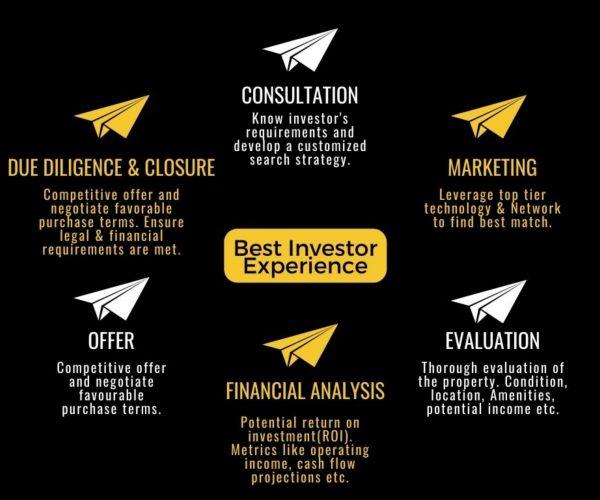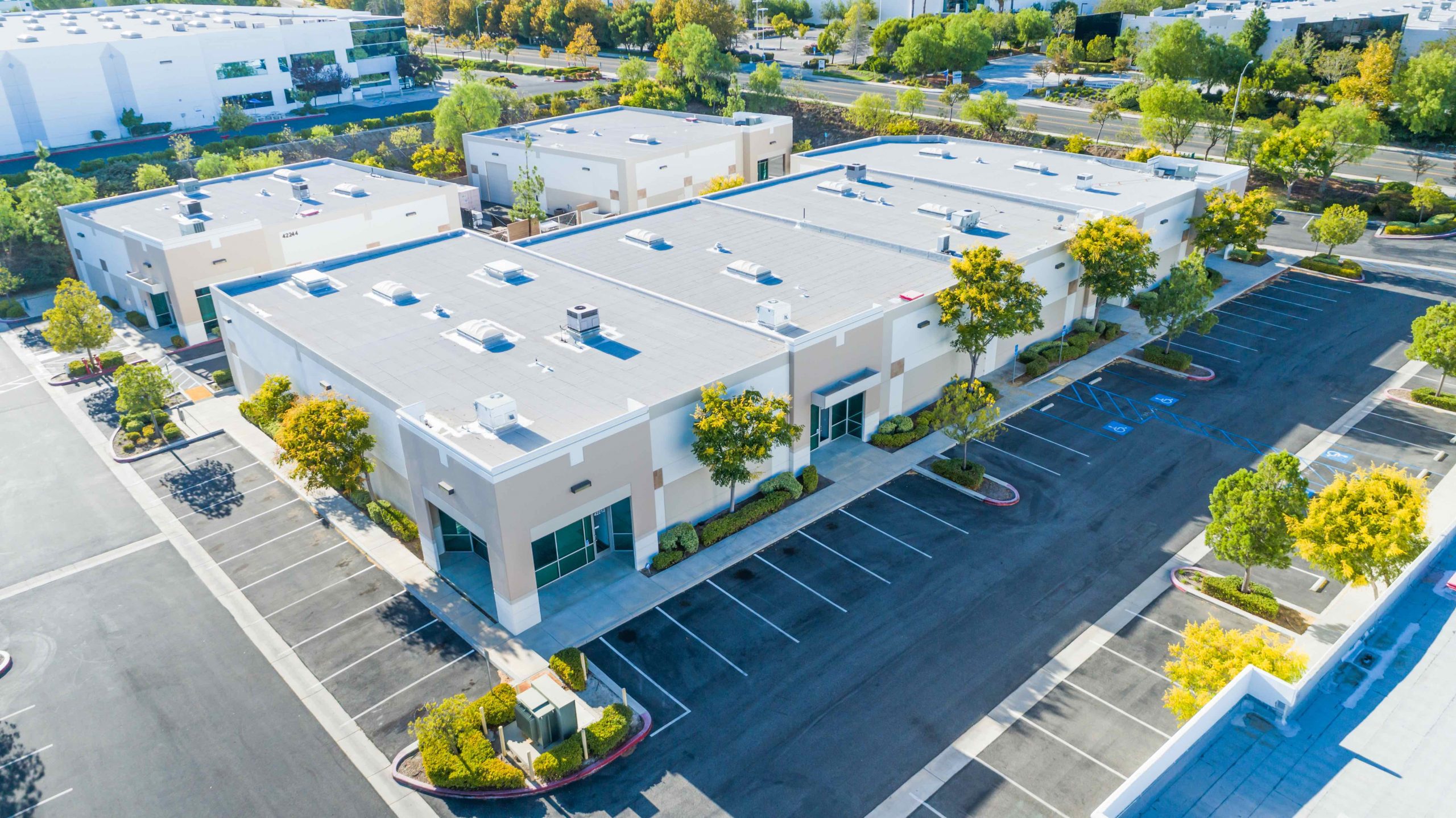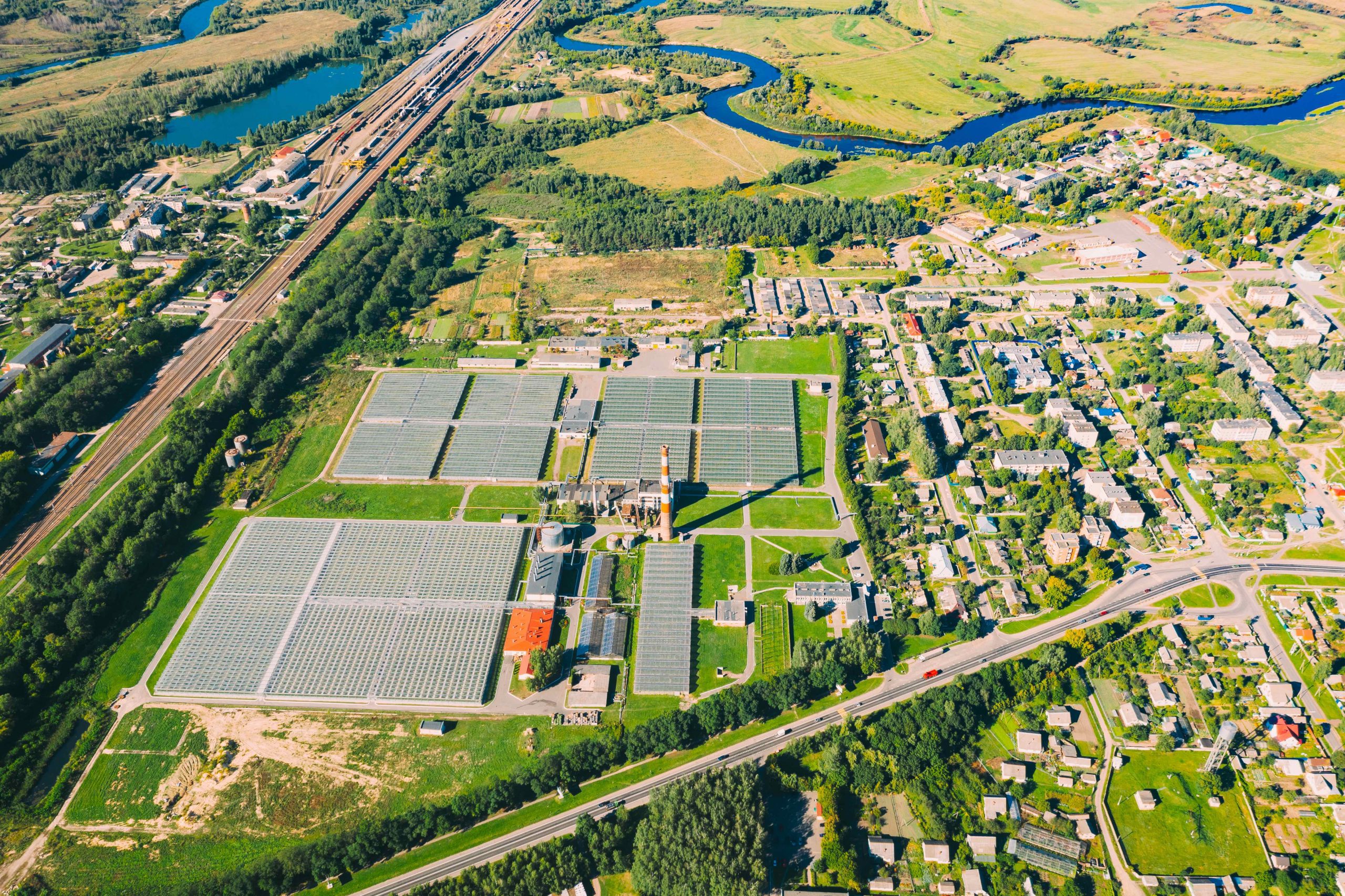commercial real estate for investors
Our team of experienced brokers will work closely with you to understand your investment objectives and develop a customized investment strategy that's tailored to your specific requirements. We'll leverage our extensive network of industry contacts and use the latest technology and data analysis tools to help you find the right commercial properties for sale in Orlando.
Click here for the listing : BREFL Listings
A trusted and a friendly advisor helping out Investors find the best commercial properties for sale in orlando
We also understand that investing in commercial property can involve a range of legal and financial complexities. That's why we work closely with our clients to ensure that all legal and financial requirements are met and that the investment is structured in a way that maximizes profitability and minimizes risk.

Here are few steps that potential investors looking to invest in retail property should look into.
Determine investment criteria: The investor will need to determine their investment criteria for a retail property, including their budget, desired location, size, and other specific needs.
Search for available properties: The investor will search for available retail properties that meet their investment criteria. They may consult with a real estate agent or conduct their own research to find potential properties.
Conduct due diligence: Once the investor has identified a suitable property, they will conduct due diligence to assess the property’s value and potential risks. This may include reviewing financial statements, market data, and other relevant information.
Assess potential returns: The investor will assess the potential returns on the investment, including potential rental income, operating expenses, and potential appreciation in the property’s value over time.
Secure financing: If the investor decides to move forward with the investment, they will need to secure financing to purchase the property. This may involve obtaining a mortgage or other financing options.
Negotiate purchase terms: The investor will need to negotiate the terms of the purchase agreement, including the purchase price, closing costs, and other important details. They may consult with a real estate attorney or other professionals to help negotiate favorable terms.
Complete the transaction: Once the purchase terms are agreed upon, the investor and seller will sign the final purchase agreement and complete the transaction. The investor will typically pay a down payment and obtain financing to complete the purchase.
Manage the property: Once the property is purchased, the investor will need to manage the property and ensure that it is properly maintained and rented to tenants. They may hire a property management company to handle day-to-day operations or manage the property themselves.
Monitor the investment: The investor will need to monitor the performance of the investment and make adjustments as necessary to maximize returns. This may include making improvements to the property, raising rents, or selling the property if market conditions change.
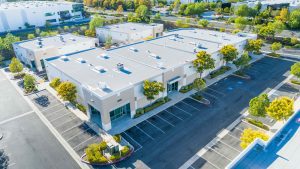
When looking for an office property, we recommend our clients to look into following information
Determine your budget: It’s important to have a clear understanding of how much you are able to spend on a property. This will help you narrow down your options and focus on properties that are within your price range.
Identify your target location: Consider factors such as foot traffic, accessibility, parking, and competition when choosing a location for your retail store. You may also want to consider the demographics of the surrounding area and how well your store’s products or services may be received.
Consider the size and layout of the property: Make sure that the property you are considering is the right size for your needs and that the layout is suitable for your business. For example, you may need a property with a large storefront or display area, or one that has a spacious back room for storage.
Evaluate the condition of the property: Consider the condition of the property, including any needed repairs or renovations. Determine if the property is in good condition and whether the costs of any needed repairs or renovations are feasible within your budget.
Understand the terms of the lease or purchase: Carefully review the terms of the lease or purchase agreement, including the length of the lease, the amount of rent or mortgage payments, and any provisions for renewal or termination. Make sure that the terms are favorable and that they align with your business needs.
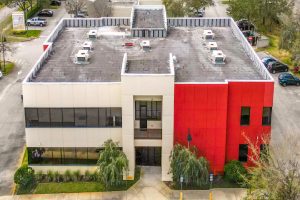
When looking for an property in a multi family environment, we recommend our client to look into following information.
Determine your budget: It’s important to have a clear understanding of how much you are able to spend on a property. This will help you narrow down your options and focus on properties that are within your price range.
Identify your target location: Consider factors such as foot traffic, accessibility, parking, and competition when choosing a location for your retail store. You may also want to consider the demographics of the surrounding area and how well your store’s products or services may be received.
Consider the size and layout of the property: Make sure that the property you are considering is the right size for your needs and that the layout is suitable for your business. For example, you may need a property with a large storefront or display area, or one that has a spacious back room for storage.
Evaluate the condition of the property: Consider the condition of the property, including any needed repairs or renovations. Determine if the property is in good condition and whether the costs of any needed repairs or renovations are feasible within your budget.
Understand the terms of the lease or purchase: Carefully review the terms of the lease or purchase agreement, including the length of the lease, the amount of rent or mortgage payments, and any provisions for renewal or termination. Make sure that the terms are favorable and that they align with your business needs.
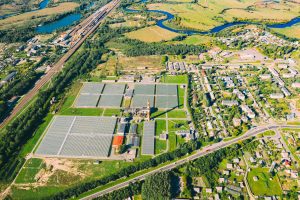
There are a variety of regulations that you will need to keep in mind when buying an industrial property in Orlando, USA. Some of the most important regulations to consider include:
Zoning laws: Zoning laws regulate the use of land in a given area, including the types of businesses that are allowed to operate on a particular property. It is important to understand the zoning laws that apply to the property you are considering and to ensure that the property is zoned for industrial use.
Environmental regulations: Industrial properties may be subject to various environmental regulations, such as regulations related to air and water pollution, hazardous materials, and waste disposal. It is important to understand any environmental regulations that apply to the property and to ensure that the property complies with these regulations.
Building codes: Industrial properties are subject to building codes that regulate the construction, maintenance, and safety of buildings. It is important to ensure that the property meets all relevant building codes and to make any necessary repairs or upgrades to bring the property into compliance.
Occupational Safety and Health Administration (OSHA) regulations: Industrial properties are subject to OSHA regulations, which are designed to protect the health and safety of workers. It is important to understand and comply with any OSHA regulations that apply to the property.
Overall, it is important to carefully review and understand the various regulations that may apply to an industrial property in Orlando, USA. Failing to comply with these regulations can result in fines, legal penalties, and other consequences.

There are a variety of regulations that you will need to keep in mind when buying a hospitality property in Orlando, USA. Some of the most important regulations to consider include:
Zoning laws: Zoning laws regulate the use of land in a given area, including the types of businesses that are allowed to operate on a particular property. It is important to understand the zoning laws that apply to the property you are considering and to ensure that the property is zoned for hospitality use.
Building codes: Hospitality properties are subject to building codes that regulate the construction, maintenance, and safety of buildings. It is important to ensure that the property meets all relevant building codes and to make any necessary repairs or upgrades to bring the property into compliance.
Environmental regulations: Hospitality properties may be subject to various environmental regulations, such as regulations related to air and water pollution, hazardous materials, and waste disposal. It is important to understand any environmental regulations that apply to the property and to ensure that the property complies with these regulations.
Occupational Safety and Health Administration (OSHA) regulations: Hospitality properties are subject to OSHA regulations, which are designed to protect the health and safety of workers and guests. It is important to understand and comply with any OSHA regulations that apply to the property.
Licensing and permit requirements: Hospitality properties may be subject to various licensing and permit requirements, such as a business license, a liquor license, and a food service permit. It is important to understand and comply with these requirements in order to operate the property legally.
Overall, it is important to carefully review and understand the various regulations that may apply to a hospitality property in Orlando, USA. Failing to comply with these regulations can result in fines, legal penalties, and other consequences.

When considering investing in specialty properties in commercial real estate, there are several factors to consider. Here are some important ones:
Market Demand: The first step is to research the local market and determine the demand for the specific type of specialty property you are considering. For example, if you are interested in investing in a medical office building, it is important to understand the demand for healthcare services in the area.
Location: The location of the specialty property is a crucial factor to consider. Factors like accessibility, proximity to public transportation, and nearby amenities should be taken into account.
Property Condition: The condition of the property should also be evaluated before investing. Consider things like age of the building, condition of the roof, plumbing and electrical systems, and any necessary repairs or upgrades.
Tenant Quality: If the property is already leased, it is important to evaluate the quality of the current tenants. For example, in the case of a retail property, you would want to look at the tenant’s financial stability, their rent payment history, and the length of their lease.
Financing: It is important to understand the financing options available for specialty properties in commercial real estate. This includes evaluating the current interest rates, loan terms, and down payment requirements.
Market Trends: Keep an eye on the latest trends in commercial real estate to ensure that you make informed decisions. For example, emerging technologies, such as smart building systems and green energy, could impact the value of your investment.
Legal Considerations: Consult with a lawyer to ensure that you understand the legal requirements and regulations for owning and operating a specialty property in your target market.

Investing in agricultural land can be a complex and risky endeavor, and it is important to carefully consider the potential risks and rewards before making a decision. Here are a few factors to consider when evaluating the potential for investing in agricultural land in Orlando, USA:
Market demand: Consider the demand for the types of crops or livestock that can be produced on the land, as well as any potential competition in the market.
Physical characteristics of the land: Evaluate the quality of the soil, the availability of water, and the topography of the land to determine its suitability for agricultural use.
Access to resources: Consider the availability of labor, equipment, and other resources that may be needed to operate the farm, such as seed, fertilizer, and fuel.
Regulatory environment: Understand any local, state, or federal regulations that may impact the use of the land for agriculture, such as zoning laws, environmental regulations, and farm labor laws.
Economic factors: Consider the potential costs of operating the farm, including the cost of inputs and the potential return on investment. Also consider the overall economic climate and any potential risks or uncertainties that may affect the agricultural market.
Overall, investing in agricultural land can be a risky but potentially rewarding venture. It is important to carefully evaluate the potential risks and rewards and to seek the guidance of a financial advisor or professional before making a decision.
COMMERCIAL SERVICES
EXPAND THE BELOW SECTIONS TO READ MORE ON OUR SERVICE...
We will conduct a search for suitable properties, utilizing our network, technology and market expertise to identify commercial properties for sale in Orlando.
Once suitable properties are identified, we will schedule property tours, providing the buyer with an in-depth view of a commercial properties for sale in Orlando.
Expert Financial analysis is provided, which is guaranteed to help the client make a smart investment decision.
A broker price opinion (BPO) is a report prepared by a real estate broker that provides an estimate of the market value of a property. A BPO is similar to an appraisal, but it is typically less comprehensive and is not as rigorously developed as an appraisal.
It is simply a tool that can be used to help financial institutions and other parties make informed decisions about the property.
We provide the client with an onsite attorney, offering valuable legal expertise, including lease negotiations, due diligence, and contract review, ensuring a smooth and successful transaction.
Due diligence is a process of carefully reviewing and evaluating a property before making a purchase. It is an important step in the property buying process, as it helps buyers understand the condition of the commercial properties for sale in Orlando and any potential risks or issues that may affect the value of the property.
When one of the commercial properties for sale in Orlando is identified, we will assist the buyer with making an offer, negotiating the terms of the transaction, and ensuring all necessary documentation is in place.
We leverage our extensive banking relationships, providing the client with access to competitive financing options and expert guidance on navigating complex financial structures, resulting in a seamless and cost-effective real estate transaction.
Property management involves the oversight and maintenance of real estate properties, including residential, commercial, and industrial properties.
It has wide range of tasks including but not limited to rent collection, maintenance, tenant relations, marketing and leasing, financial management etc..
100M $ PLUS
MILLION DOLLAR CLUB MEMBER
A + Rated
A + Rated business by Better Business Bureau
Top Rated
5 Star rated business on google
FINANCIAL ANALYSIS
We provide our clients with an in-depth financial analysis, including market trends, cash flow projections, and potential risks, enabling the client to make informed and profitable investment decisions.
End-To-End Solutions
We specialize in assisting clients with every aspect of real estate transactions, from identifying suitable commercial properties for sale in Orlando and negotiating deals to managing the legal and financial aspects of the process.
BANKING RELATIONSHIPS
We leverage our extensive banking relationships, providing the client with access to competitive financing options and expert guidance on navigating complex financial structures, resulting in a seamless and cost-effective real estate transaction.
Let's Get Started
We would love to help you, please leave us your message and contact details
TERMS AND CONDITIONS

contact us
1850 N Alafaya Trail,
Ste 1A, Orlando, FL, 32826
info@brefl.com
+1 (407) 867 0007
